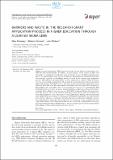| dc.contributor.author | Dempsey, Mary | |
| dc.contributor.author | Brennan, Attracta | |
| dc.contributor.author | McAvoy, John | |
| dc.date.accessioned | 2020-10-08T07:43:43Z | |
| dc.date.available | 2020-10-08T07:43:43Z | |
| dc.date.issued | 2020-09 | |
| dc.identifier.citation | Dempsey, Mary, Brennan, Attracta, & McAvoy, John. (2020). Barriers and waste in the research grant application process in higher education througha Lean Six Sigma lens. Management and Production Engineering Review, 11(3), 119-127. doi: 10.24425/mper.2020.134938 | en_IE |
| dc.identifier.issn | 2082-1344 | |
| dc.identifier.uri | http://hdl.handle.net/10379/16213 | |
| dc.description.abstract | Higher education institutions (HEIs) typically generate income from two main sources; student
fees and research income. In contrast, the predominant waste streams in HEIs tend
to include; (1) assignment/examination mark submission process, (2) photocopying process
and (3) the funding application process. Unintended internal process complexities and barriers
typically aggravate the challenges already inherent in the research grant application
process. Although Lean Six Sigma (LSS) has been adopted by a number of HEIs in Ireland,
very few have adopted an integrated LSS approach for waste reduction in the research grant
application process. To identify barriers and waste in the research grant application process
within an Irish HEI in an EU environment, the authors used an online survey deployed to
240 academics and researchers. The survey response rate was 13%. The participating HEI
in this pilot study generated an annual income (including student fees and research income)
exceeding e240 million for the academic year 2017/2018. Using an LSS lens, this paper identified
the primary waste in the research grant application process from an academic and
researcher perspective to be; editing and revising applications, liaising and communicating
with collaborators and waiting for information. Organised thematically, the main barriers
were strategic thinking, collaborator identification and co-ordination, eligibility, process,
time and support & mentoring. The results from this study can be used to inform the next
stage of the research where empirical studies will be carried out in other HEIs to develop a
practical roadmap for the implementation of LSS as an operational excellence improvement
methodology in the research grant application process. | en_IE |
| dc.format | application/pdf | en_IE |
| dc.language.iso | en | en_IE |
| dc.publisher | De Gruyter | en_IE |
| dc.relation.ispartof | Management and Production Engineering Review | en |
| dc.rights | Attribution-NonCommercial-NoDerivs 3.0 Ireland | |
| dc.rights.uri | https://creativecommons.org/licenses/by-nc-nd/3.0/ie/ | |
| dc.subject | Lean Six Sigma | en_IE |
| dc.subject | Higher Education | en_IE |
| dc.subject | Research Grant Application | en_IE |
| dc.title | Barriers and waste in the research grant application process in higher education through a Lean Six Sigma lens | en_IE |
| dc.type | Article | en_IE |
| dc.date.updated | 2020-10-07T16:26:20Z | |
| dc.identifier.doi | 10.24425/mper.2020.134938 | |
| dc.local.publishedsource | https://dx.doi.org/10.24425/mper.2020.134938 | en_IE |
| dc.description.peer-reviewed | peer-reviewed | |
| dc.internal.rssid | 19570559 | |
| dc.local.contact | Mary Dempsey, Mechanical Engineering, Eng-2048, Engineering Building, Nui Galway. 2258 Email: mary.dempsey@nuigalway.ie | |
| dc.local.copyrightchecked | Yes | |
| dc.local.version | PUBLISHED | |
| nui.item.downloads | 77 | |


